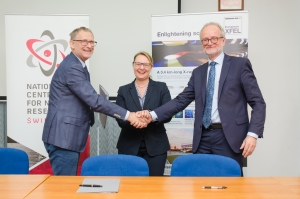Scientific Big Data Analysis for the European XFEL
29-10-2019
On 23rd October, Professor Robert Feidenhans’l, Executive Director of European XFEL GmbH and Professor Krzysztof Kurek, NCBJ Director General have signed an addendum to the NCBJ-XFEL agreement, as well as an agreement on implementing the Scientific Big Data Analysis project. The XFEL delegation also met with the potential Polish users of the laser.
The visit of the management board of Eu-XFEL Was an opportunity to talk about cooperation between the institutions and to define the possibilities and needs of joint projects, primarily regarding the processing of data generated during scientific experiments on free electron laser in Hamburg.
The Świerk Computing Center is one of the largest IT centers in Poland, which has the ability to process such a large amount of data as those that have been created in experiments on the European X-ray Free Electron Laser for over 2 years. CIŚ has experience in operations on data from large experiments. The center, which has Tier-2 node status, is one of the main places for collecting and processing data for the LHCb detector – one of the great experiments carried out at the Large Hadron Collider at CERN. These competences and experience will soon be also useful for XFEL users, including Polish scientists.
After the ceremony of signing the agreement with NCBJ, in the second part of its visit to Warsaw, the management board of Eu-XFEL met with members of the XFEL-Polska Consortium and Polish users of XFEL sources. Eu-XFEL employees presented measurement capabilities using XFEL sources, in particular the most modern one, recently commissioned in Hamburg. Scientists from the Faculty of Physics PW, IFJ PAN, Faculty of Physics UAM, AGH and the Faculty of Chemistry of the University of Warsaw presented their plans for cooperation or their ongoing work with Eu-XFEL. Among others, Associate Professor Jerzy Antonowicz from the Faculty of Physics of the Warsaw University of Technology told about the results of the latest research led by Polish scientists using Eu-XFEL, regarding ultrafast structural changes as a result of melting and crystallization of metals. Associate Professor Jakub Szlachetko presented the topics of research using XFEL sources conducted at the IFJ PAN, including those regarding DNA destruction and repair mechanisms, or nonlinear processes in atomic physics.
„The European XFEL is a unique source of strong, ultra-short pulses of coherent X-rays, the use of which opens new measurement possibilities in many disciplines of science and technology, which are affecting our daily lives, including medicine, pharmacology, chemistry, materials science, nanotechnology, energy and electronics” – said Ryszard Sobierajski, PhD, from Institute of Physics of the Polish Academy of Sciences, which is the leader of the XFEL-Polska Scientific and Research Consortium, bringing together 28 Polish institutions. „The consortium enables the exchange of experiences between scientists already using radiation from XFEL sources and their new users. In the near future, the number of experiments performed on the XFEL source in Hamburg will be significantly increased. To be able to fully use the offered scientific potential, it is necessary to prepare Polish scientific staff for this task, for example through meeting like this one. „
In the afternoon, during the third part of the visit, the delegation of XFEL GmbH met with Mateusz Gaczyński – Deputy Director of the Department of Innovation and Development of the Ministry of Science and Higher Education, in the presence of representatives of the NCBJ. Researchers presented plans for further cooperation with NCBJ in the field of analysis of experimental data from the XFEL research infrastructure and conducted talks aimed at explaining the conditions for obtaining support from the Minister’s Program „International Co-financed Projects”, including cooperation with foreign institutions regarding the use of large research infrastructures.





